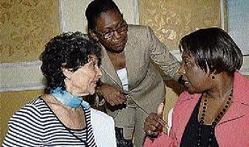Sexual harassment legislation coming soon
Published: Monday | April 27, 2009

Olivia Grange (right), Minister of Youth, Sports and Culture, in conversation with Hilary Nicholson (left), training coordinator of Women's Media Watch - Jamaica, and Enid Harrow during the Bureau of Women's Affairs forum at the Terra Nova All-Suite Hotel in St Andrew last Tuesday. - Ian Allen/Staff Photographer
Minister of Youth, Sports and Culture with responsibility for Gender Affairs, Olivia Grange, said legislation would come into effect against sexual harassment within this financial year. Minister Grange was the guest speaker at a forum on sexual harassment held at the Terra Nova All-Suite Hotel last Tuesday.
The forum, 'Sexual Harassment '(W)Rap UP', was put on by the Bureau of Women's Affairs and Women's Media Watch. During her presentation, she showed the document, submitted by the groups, which would be thoroughly reviewed before reaching a point of legislation.
The forum was the culmination of a year of events aimed at sensitising the public on sexual harassment, executed by both women's groups. The programme, funded by the United Nations Development Fund for Women (UNIFEM), focused on research, policy/legal reform and advocacy/public education.
"UNIFEM funded the workshops which are aimed at sensitising people on violence against women, with sexual harassment being one aspect," said Faith Webster, executive director of the Bureau of Women's Affairs.
Working together, the two groups conducted seminars within work places to give employees and human resource personnel the tools needed to understand what is sexual harassment and how it can be addressed in their environment.
The entire presentation reinforced that sexual harassment includes unwanted words, actions and gestures which offend the other party.
Definition
The definition from the literature reads: "Unwelcome sexual advances, requests for sexual favours, and other verbal or physical conduct of a sexual nature. When submission to or rejection of this conduct explicitly or implicitly affects an individual's employment, unreasonably interferes with an individual's work performance or creates an intimidating, hostile or offensive work environment."
"It's not just a matter of whether a part of someone's anatomy gets touched. Whether it's the male anatomy or the female anatomy," said Hilary Nicholson, training coordinator, Women's Media Watch. "It happens to women, it happens to men. It's an abuse of power that is used to intimidate, control and to maintain sometimes a particular status quo," she added.
According to Webster, they have exceeded an initial target of training 475 individuals, reaching 1,081 (911 were staff members and 170 human resource personnel), but they will continue working on the issue.


